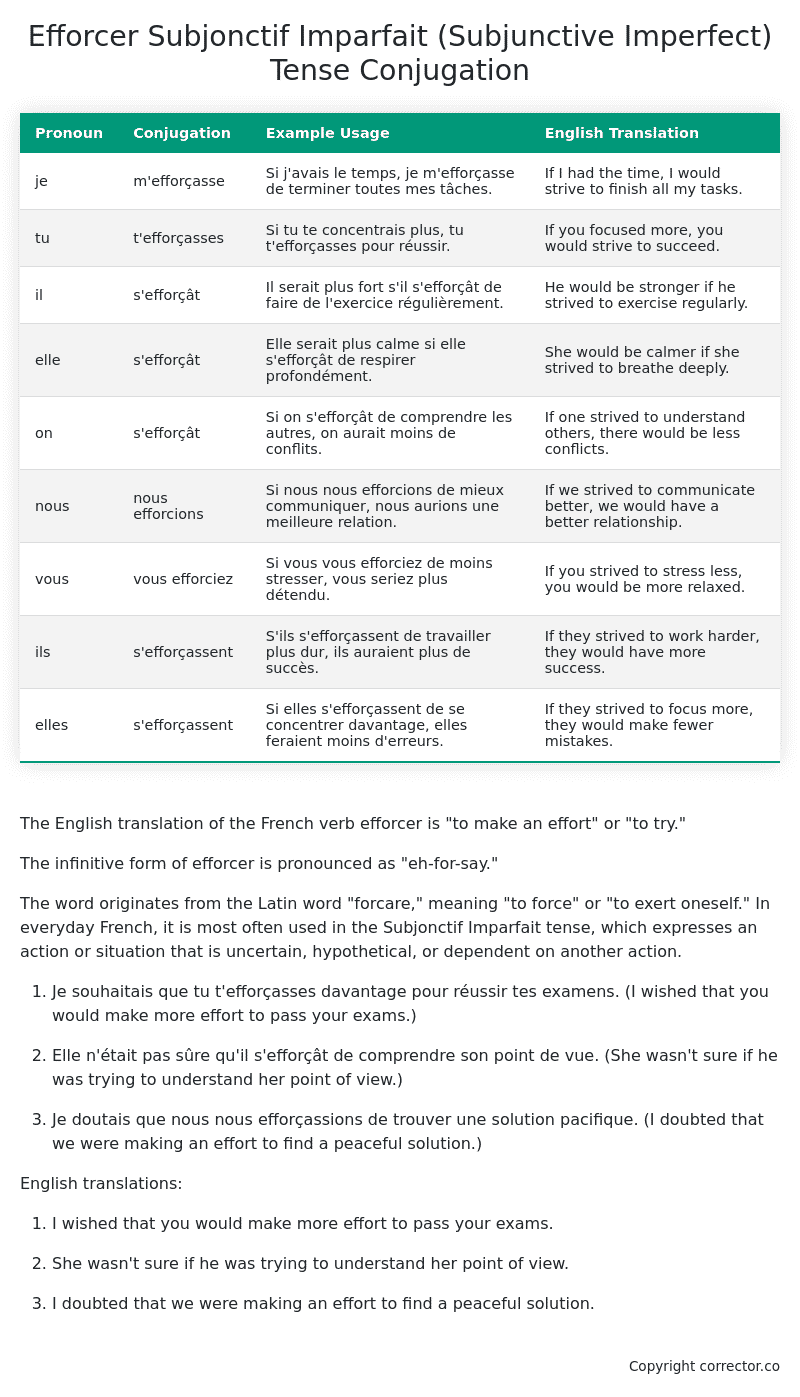Subjonctif Imparfait (Subjunctive Imperfect) Tense Conjugation of the French Verb efforcer
Introduction to the verb efforcer
The English translation of the French verb efforcer is “to make an effort” or “to try.”
The infinitive form of efforcer is pronounced as “eh-for-say.”
The word originates from the Latin word “forcare,” meaning “to force” or “to exert oneself.” In everyday French, it is most often used in the Subjonctif Imparfait tense, which expresses an action or situation that is uncertain, hypothetical, or dependent on another action.
-
Je souhaitais que tu t’efforçasses davantage pour réussir tes examens. (I wished that you would make more effort to pass your exams.)
-
Elle n’était pas sûre qu’il s’efforçât de comprendre son point de vue. (She wasn’t sure if he was trying to understand her point of view.)
-
Je doutais que nous nous efforçassions de trouver une solution pacifique. (I doubted that we were making an effort to find a peaceful solution.)
English translations:
-
I wished that you would make more effort to pass your exams.
-
She wasn’t sure if he was trying to understand her point of view.
-
I doubted that we were making an effort to find a peaceful solution.
Table of the Subjonctif Imparfait (Subjunctive Imperfect) Tense Conjugation of efforcer
| Pronoun | Conjugation | Example Usage | English Translation |
|---|---|---|---|
| je | m’efforçasse | Si j’avais le temps, je m’efforçasse de terminer toutes mes tâches. | If I had the time, I would strive to finish all my tasks. |
| tu | t’efforçasses | Si tu te concentrais plus, tu t’efforçasses pour réussir. | If you focused more, you would strive to succeed. |
| il | s’efforçât | Il serait plus fort s’il s’efforçât de faire de l’exercice régulièrement. | He would be stronger if he strived to exercise regularly. |
| elle | s’efforçât | Elle serait plus calme si elle s’efforçât de respirer profondément. | She would be calmer if she strived to breathe deeply. |
| on | s’efforçât | Si on s’efforçât de comprendre les autres, on aurait moins de conflits. | If one strived to understand others, there would be less conflicts. |
| nous | nous efforcions | Si nous nous efforcions de mieux communiquer, nous aurions une meilleure relation. | If we strived to communicate better, we would have a better relationship. |
| vous | vous efforciez | Si vous vous efforciez de moins stresser, vous seriez plus détendu. | If you strived to stress less, you would be more relaxed. |
| ils | s’efforçassent | S’ils s’efforçassent de travailler plus dur, ils auraient plus de succès. | If they strived to work harder, they would have more success. |
| elles | s’efforçassent | Si elles s’efforçassent de se concentrer davantage, elles feraient moins d’erreurs. | If they strived to focus more, they would make fewer mistakes. |
Other Conjugations for Efforcer.
Le Present (Present Tense) Conjugation of the French Verb efforcer
Imparfait (Imperfect) Tense Conjugation of the French Verb efforcer
Passé Simple (Simple Past) Tense Conjugation of the French Verb efforcer
Passé Composé (Present Perfect) Tense Conjugation of the French Verb efforcer
Futur Simple (Simple Future) Tense Conjugation of the French Verb efforcer
Futur Proche (Near Future) Tense Conjugation of the French Verb efforcer
Plus-que-parfait (Pluperfect) Tense Conjugation of the French Verb efforcer
Passé Antérieur (Past Anterior) Tense Conjugation of the French Verb efforcer
Futur Antérieur (Future Anterior) Tense Conjugation of the French Verb efforcer
Subjonctif Présent (Subjunctive Present) Tense Conjugation of the French Verb efforcer
Subjonctif Passé (Subjunctive Past) Tense Conjugation of the French Verb efforcer
Subjonctif Imparfait (Subjunctive Imperfect) Tense Conjugation of the French Verb efforcer (this article)
Subjonctif Plus-que-parfait (Subjunctive Pluperfect) Tense Conjugation of the French Verb efforcer
Conditionnel Présent (Conditional Present) Tense Conjugation of the French Verb efforcer
Conditionnel Passé (Conditional Past) Tense Conjugation of the French Verb efforcer
L’impératif Présent (Imperative Present) Tense Conjugation of the French Verb efforcer
L’infinitif Présent (Infinitive Present) Tense Conjugation of the French Verb efforcer
Struggling with French verbs or the language in general? Why not use our free French Grammar Checker – no registration required!
Get a FREE Download Study Sheet of this Conjugation 🔥
Simply right click the image below, click “save image” and get your free reference for the efforcer Subjonctif Imparfait tense conjugation!

Efforcer – About the French Subjonctif Imparfait (Subjunctive Imperfect) Tense
Formation
Common Everyday Usage Patterns
Interactions with Other Tenses
Subjonctif Présent
Indicatif Passé Composé
Conditional
Conditional Perfect
Summary
I hope you enjoyed this article on the verb efforcer. Still in a learning mood? Check out another TOTALLY random French verb conjugation!


